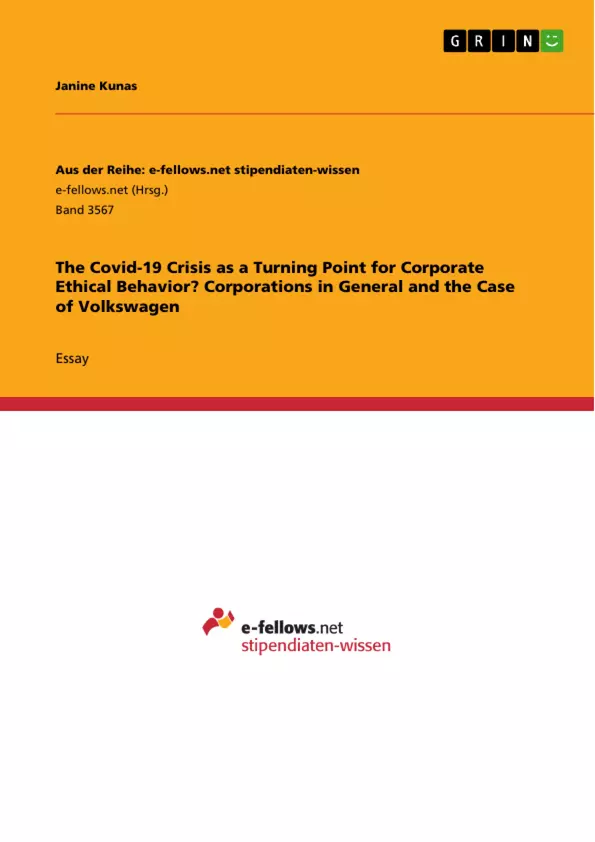The Scientific Essay analyses the question whether it is possible for companies to agree on ethical and economic goals and to establish a permanent ethical corporate strategy as a result of the Covid-19 pandemic.
For that key question, the Scientific Essay using three concepts of the module Business Ethics analyse and discuss the challenges and opportunities arising from the Covid-19 crisis in general and for Volkswagen. The concepts, which are initially defined and form the basis of the Scientific Essay, are: License to Operate, Triple Bottom Line, Corporate Responsibility.
In the main part, the challenges and opportunities of the pandemic are presented based on the concepts. With reference to the title, it is particularly emphasized to what extent the Covid-19 crisis represents a turning point. Based on this chapter, the Volkswagen company is analysed. The contrast between the emission scandal and the new ethical orientation of VW is shown during the pandemic.
Finally, the conclusion is drawn looking back at the entire Essay.
Inhaltsverzeichnis (Table of Contents)
- Introduction
- Presentation of the topic in the context of Business Ethics
- Procedure and objectives of the Scientific Essay
- Main Concepts
- License to Operate
- Triple Bottom Line
- Corporate Responsibility
- Ethical and responsibility challenges and opportunities arising from the Covid-19 crisis in general
- Volkswagen Group AG
- Conclusion
Zielsetzung und Themenschwerpunkte (Objectives and Key Themes)
This scientific essay examines the impact of the Covid-19 crisis on corporate ethical behavior, particularly focusing on the case of Volkswagen. It explores the challenges and opportunities presented by the pandemic in terms of corporate responsibility, using three key concepts from business ethics: License to Operate, Triple Bottom Line, and Corporate Responsibility. The essay aims to analyze whether the crisis represents a turning point for ethical corporate strategies.
- The role of the Covid-19 crisis in challenging and shaping corporate ethical behavior
- The impact of the pandemic on the concept of License to Operate and its connection to corporate responsibility
- The relevance of the Triple Bottom Line concept in the context of the crisis and its implications for sustainability and ethical decision-making
- The analysis of Volkswagen's ethical response to the Covid-19 crisis in light of its past emissions scandal
- The potential for the crisis to act as a catalyst for lasting changes in ethical corporate strategies
Zusammenfassung der Kapitel (Chapter Summaries)
The introduction establishes the context of the essay by outlining the role of ethical considerations in business decision-making, especially in times of crisis. The essay then defines and elaborates on three key concepts: License to Operate, Triple Bottom Line, and Corporate Responsibility. These concepts are used to analyze the challenges and opportunities presented by the Covid-19 crisis for businesses in general.
The essay proceeds to delve into the specific case of the Volkswagen Group AG, examining its ethical response to the pandemic in light of its previous emissions scandal. The analysis focuses on the extent to which the crisis might have influenced a shift towards a more ethical corporate strategy for Volkswagen.
Schlüsselwörter (Keywords)
The key terms and concepts explored in this essay include: business ethics, corporate responsibility, License to Operate, Triple Bottom Line, Covid-19 crisis, ethical challenges, ethical opportunities, corporate strategy, sustainability, Volkswagen, emissions scandal.
Frequently Asked Questions
Can the Covid-19 pandemic lead to more ethical corporate strategies?
The essay explores whether the pandemic serves as a turning point for companies to align their economic goals with permanent ethical responsibilities.
What is the "License to Operate" concept?
The License to Operate refers to the ongoing acceptance of a company's business practices by its stakeholders and society at large, which was significantly tested during the Covid-19 crisis.
How does the "Triple Bottom Line" apply to the crisis?
The Triple Bottom Line emphasizes that companies should focus on three parts: social, environmental, and financial. The crisis highlighted the need for a balance between these aspects for long-term sustainability.
How did Volkswagen respond ethically during the pandemic?
The essay analyzes VW's response to Covid-19, contrasting it with the previous emissions scandal to see if the company has adopted a more responsible corporate orientation.
What are the main challenges of Corporate Responsibility during a pandemic?
Challenges include maintaining employee safety, ensuring supply chain ethics, and managing financial stability without compromising ethical standards.
- Quote paper
- Janine Kunas (Author), 2020, The Covid-19 Crisis as a Turning Point for Corporate Ethical Behavior? Corporations in General and the Case of Volkswagen, Munich, GRIN Verlag, https://www.grin.com/document/932328



